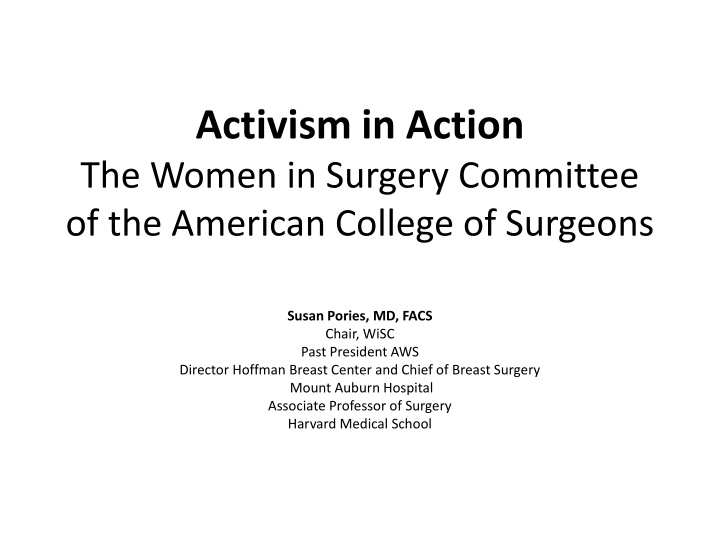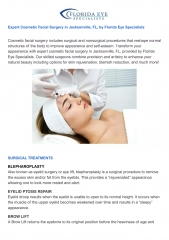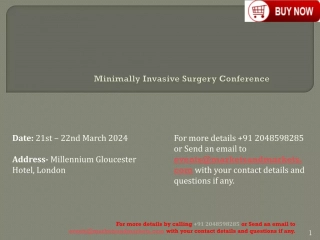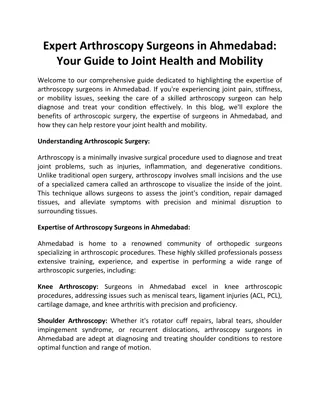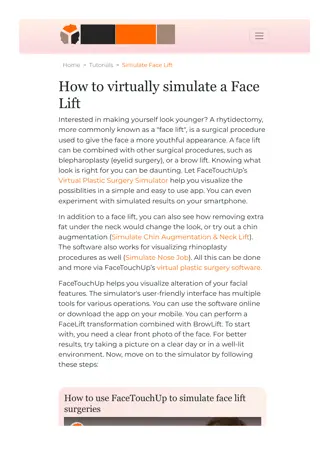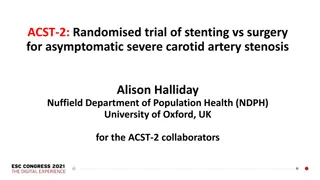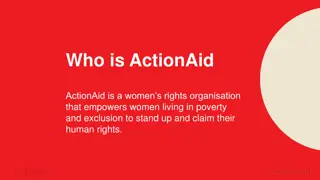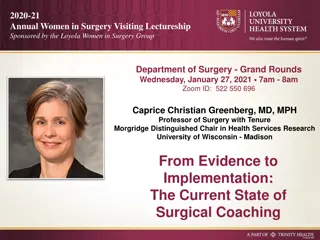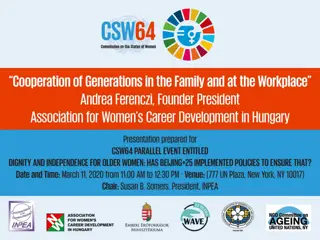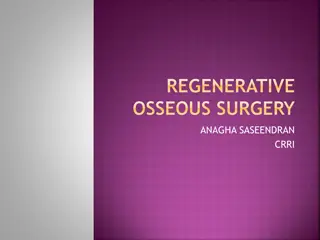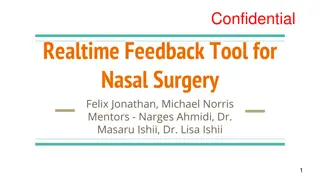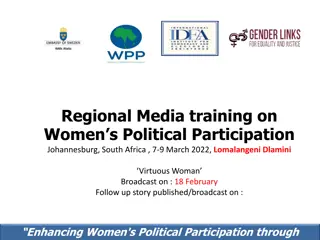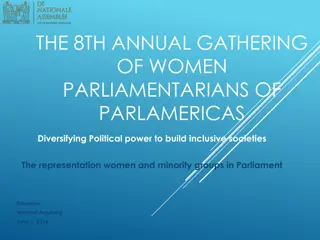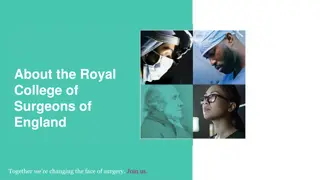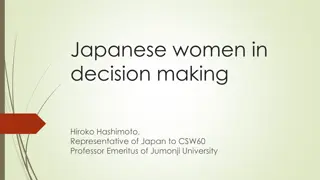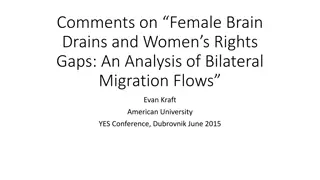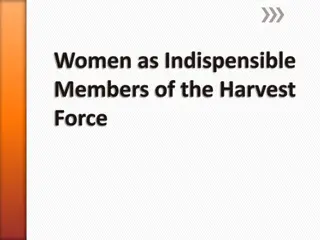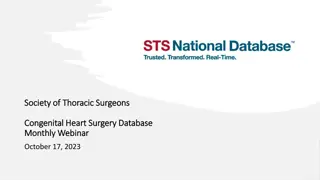Women in Surgery Committee - Empowering Female Surgeons Across Generations
The Women in Surgery Committee at the American College of Surgeons is dedicated to empowering women surgeons of all ages and practice types. Through fostering inclusion, respect, and leadership development, the committee aims to enhance career satisfaction and success in the field of surgery. This historical journey highlights the significant contributions of women in surgery within the ACS over the years.
Download Presentation

Please find below an Image/Link to download the presentation.
The content on the website is provided AS IS for your information and personal use only. It may not be sold, licensed, or shared on other websites without obtaining consent from the author.If you encounter any issues during the download, it is possible that the publisher has removed the file from their server.
You are allowed to download the files provided on this website for personal or commercial use, subject to the condition that they are used lawfully. All files are the property of their respective owners.
The content on the website is provided AS IS for your information and personal use only. It may not be sold, licensed, or shared on other websites without obtaining consent from the author.
E N D
Presentation Transcript
Activism in Action The Women in Surgery Committee of the American College of Surgeons Susan Pories, MD, FACS Chair, WiSC Past President AWS Director Hoffman Breast Center and Chief of Breast Surgery Mount Auburn Hospital Associate Professor of Surgery Harvard Medical School
WiSC Mission The mission of the Women in Surgery Committee is to: enable women surgeons of all ages and practice types to develop their individual potential as professionals, promote an environment that fosters inclusion, respect, and success, develop, encourage and advance women surgeons as leaders, and provide a forum and networking opportunities to enhance women s surgical career satisfaction
Women in Surgery Committee 2018 Members Virginia R. Litle, MD FACS Michele Ann Manahan, MD FACS, Liaison YFA Daniela Molena, MD FACS Jenny Ousley, MD Hilary A. Sanfey, MB BCh FACS, Consultant Shalini Sarkar, MBBS, RAS Liaison Carrie A. Sims, MD FACS Norma Michelle Smalls, MD FACS Sharon Lisa Stein, MD FACS Jamie Sue Ullman, MD FACS, Liaison Tammara L. Watts, MD PhD FACS Pooja Suguna Yesantharao Tiffany Sinclair, MD| Susan Elaine Pories, MD FACS, Chair Nancy N. Baxter, MD, FACS, FRCSC ,Vice Chair Annesley Williamson Copeland, MD FACS, Liaison - Board of Governors Steven Li-Wen Chen, MD FACS Ainhoa Costas-Chavarri, MD FACS Marie L. Crandall, MD FACS, Liason-AWS Nasim Hedayati, MD FACS Celeste Marie Hollands, MD FACS, Special Member Kazumi Kawase, MD FACS Mary Emily Klingensmith, MD FACS Rosemary Ann Kozar, MD FACS, Consultant Kate H. Kraft, MD FACS Barbara S. Levy, MD FACS Connie Bura, Staff Liz McAllister, Staff Patricia Turner, MD, FACS, Director, Division of Member Services
WiSC Subcommittees/Activities Awards: Drs. Norma Smalls Advocacy: All Communications/Structure and Function: Dr. Barbara Levy International: Dr. Sharon Stein Leadership Seminars: Dr. Susan Pories Mentoring: Dr. Nancy Baxter Personal Empowerment: Dr. Carrie Sims Program: Dr. AJ Copeland
Brief History of Women in ACS 1913 First class of ACS fellows includes 5 women 1925: Drs, Lillian K. P. Farrar and Agnes C. Vietor first women to serve on the ACS Board of Governors 1950 Dr. Helen Octavia Dickens: first African American Woman Fellow 1993 Dr. Olga Jonasson: first woman ACS executive 1993 - Dr. Kathryn Anderson: first woman BOR secretary 1995 AWS recognized and Governor role created 1999 - Dr. Patricia Numann: first woman Second Vice President 2005 Dr. Kathryn Anderson: first woman President 2006 Dr. Patricia Numann: first woman Distinguished Service Award 2013 Dr. Julie Freischlag: first woman BOR chair Dr. Helen Octavia Dickens
History of WiSC 1998 Dr. Olga Johansson proposed that the BOR create a standing committee on women s issues. 1999 in the first report to the Regents, Dr. Jonasson removed ad hoc 2000 the Committee on Women s Issues held its first meeting in October 2007 the name was changed to the Women in Surgery Committee Chairs of WiSC have included Dr. Margaret Kemeny, Dr. Hilary Sanfey, Dr. Rosemary Kozar.
Awards Nomination of Women for ACS Leadership Positions and Awards President Barbara Bass president (2018) First Vice-President Hilary Sanfey (2016) Second Vice-President Mary McCarthy (2016) Board of Regents Lena Napolitano (2018) Lifetime Achievement Award pending Honorary Fellows Clare Marx (2018) Sachiyo Suita (2016) Surgical Volunteerism and Humanism Award Rebekah Naylor (2016) Sherry Wren (2017) Sheen Award Melina Kibbe (2017) Jacobson Innovation Award pending
American College of Surgeons Leadership Patricia Numann MD, FACS Kathryn Anderson MD, FACS Endocrine and Breast Surgery Lloyd S. Rogers Professor of Surgery State University of New York (SUNY) Upstate Medical University, Syracuse Pediatric Surgery Professor, University of Southern California and Chief of Surgery at Children s Hospital, Los Angeles 2005 2011 2017 1913-2018
Dr. Mary Edwards Walker Award Conceived by WiSC and awarded yearly at the Clinical Congress convocation in recognition of Inspiring women in surgery. Dr. Walker graduated with honors from Syracuse medical School in 1855, the only woman in her class. First woman surgeon employed by the United States Army. Served with the Union Army in the American Civil War. Held as a prisoner of war for four months after being captured when crossing enemy lines to treat wounded civilians. Only woman to ever have received the Congressional Medal of Honor, the highest United States Armed Forces decoration for bravery.
Dr. Mary Edwards Walker Award 2016: Dr. Mary Maniscalco- Theberge A Colonel in the Army, Chief of the Department of Surgery at the Army and Navy hospitals, and General Surgery Residency Program Director. Numerous positions of leadership within ACS, Metropolitan DC chapter of the ACS, and DC chapter of the Association of Women Surgeons Dr. Mary : You can't ask for change if you're not ready to do the work to make it happen.
Dr. Mary Edwards Walker Award 2017: Dr. SreyRam Kuy Associate Chief of Staff at Michael E. DeBakey Veterans Affairs Medical Center in Houston First general surgeon to serve as chief medical officer of Medicaid for the Louisiana Department of Health. Developed a Zika prevention strategy for pregnant Medicaid patients Ensured women with breast cancer had access to reconstruction Led coordination of disaster relief during historic flooding in Louisiana in 2016.
Olga Jonasson Lecture 174 To honor the memory of Olga M. Jonasson, MD, FACS Dr. Jonasson was a true pioneer and trail blazer. First woman Chair of Surgery in U.S. history. This lectureship is a testimony to leadership and education in surgery and a reflection of the capacity of women to reach academic pinnacles. Nominations for the lecture come from WiSC. Dr. Hilary Sanfey Led the fundraising effort
Olga Jonasson Lecture Year Lecturer Title 2007 Dr. Nancy Ascher The Ultimate in Surgical Translation: Transplantation 2008 Dr. Anna Ledgerwood Myths in Surgical Care 2009 Dr. Karin Muraszko Leadership Development and Mentoring in the Age of Restricted Work Hours 2010 Ms. Nina Totenberg Women in the Professions 2011 Dr. Patricia Numann Effective Advocacy 2012 Dr. Carol-Anne Moulton Peeking Behind the Curtain-Surgical Judgment Beyond Cognition 2013 Dr. Pauline Chen Conduct Unbecoming 2014 Dr. Barbara Bass Our Lives as Surgeons: Finding a Sense of Place and Purpose 2015 Dr. Julie Freischlag Resilience 2016 Dr. Alexa Canady The Journey: Becoming a neurosurgeon and back again 2017 Dr. Kathryn Anderson A Quiet Pioneer Who Started a Revolution 2018 Dr. Joan Reede A Path Toward Diversity, Inclusion and Excellence
Olga Jonasson Lecture Dr. Estelle Williams with Dr. Alexa Canady
2018 ASTS Pioneer Award Dr. Jonasson was awarded, posthumously, the 2018 ASTS Pioneer Award on Sunday, June 3rd at the American Transplant Congress (ATC) in Seattle WA. The ASTS Pioneer award is the most distinguished award bestowed upon an individual by the ASTS for a significant contribution to the field of transplantation ASTS gave a $5K contribution to the Olga Jonasson Lecture Fund at the American College of Surgeons a way of honoring Dr. Jonasson and her impact on transplant surgery. Dr. Jean Emond, ASTS president announced Dr. Jonasson as the 2018 recipient of the ASTS Pioneer Award. Dr. Nancy Ascher accepted the award on her behalf.
ACS Board of Regents 1929 2017
Advocacy ACS Statements Importance of Parental Leave Gender Salary Equity Intimate Partner Violence
Statement on the Importance of Parental Leave Online February 24, 2016 A successful surgical career should not preclude a surgeon s choice to be a parent. As a profession, surgery should be supportive of healthy pregnancy outcomes, and not punish those surgeons who choose to have children. Parental leave terms should be explicitly included in all employment contracts. Flexible and equitable schedule for the surgeon taking leave and all others affected by the absence. Surgeons should not be expected to make up for call missed during leave. The Family Medical Leave Act (FMLA) of 1993 allows employees to take up to 12 weeks of unpaid leave.
Statement on the Importance of Parental Leave Payment for parental leave should be negotiated. The surgeon should not be responsible for costs to the practice during the period of leave. Institutions and practices exempt from the FMLA law are encouraged to voluntarily allow new parents the opportunity to take unpaid leave consistent with FMLA. Surgeons who intend to breastfeed should be allowed flexibility to support expressing breast milk. Parental leave should be considered when making decisions regarding benefits, promotion, or continued employment.
Statement on Gender Salary Equity Online August 2, 2017 (developedin partnership with the Association of Women Surgeons) Substantial pay differentials exist between male and female surgeons even after adjusting for factors such as age, years of experience, specialty, work hours, and productivity. The American College of Surgeons supports pay equity among surgeons, regardless of gender. Employers should promote transparency in defining the criteria for initial and subsequent physician salaries. To ensure equitable compensation, performance reviews and benchmark salaries of all surgeons should be reviewed routinely in both academic and clinical practice settings. Any identified pay disparity should be remedied.
Statement on Gender Salary Equity Implicit bias and compensation determination training should be provided for all individuals in a position to determine salary. Compensation training should provide a thorough understanding of compensation policies, how rates of pay are determined, and how to communicate compensation. Information about compensation, including summary data by rank, years of employment, and gender should be made available to all surgeons within the department. Educational programs also should be established to help promote an understanding of self-worth and self-confidence. These educational efforts should be extended to residents and medical students so that essential negotiation skills are fostered early in training.
Personal Empowerment Intimate partner violence Bullying Harassment Dr. Sherilyn Gordon-Burroughs
Statement on Intimate Partner Violence Awaiting approval from BOR Intimate partner violence (IPV) is a major public health problem. IPV is defined as behavior designed to exert undue control over another person, using physical, sexual, verbal, or emotional abuse within the context of an intimate relationship. IPV affects both women and men, regardless of sexual orientation, gender identity, age, socioeconomic status, education, culture, religion, race, or ethnicity. Surgical colleagues and trainees are also at risk for IPV. IPV victims may feel afraid, embarrassed or ashamed, and therefore may not be forthcoming about their circumstances.
Statement on Intimate Partner Violence Women exposed to IPV have a five-fold increased risk of suicide, and 40% of female homicide victims are killed by an intimate partner. IPV is highly likely to recur, and failure to recognize it can have lethal consequences for patients, colleagues and innocent bystanders. Screening with explicit questioning can help identify victims of IPV. Patients should be referred to appropriate resources and follow up for IPV. Surgical training should include education about IPV. Surgeons should identify and intervene when colleagues and trainees are victims of IPV, or can be identified to be in an at-risk situation. Surgeons and surgical departments should develop programs within their practices and departments to help identify and support colleagues who are victims of IPV, using national and international guidelines.
Structure, Function, and Communications Women Surgeons Online Community 2016 5,573 community members 240 total discussion posts 57 new threads 183 replies to discussion 58 replies to sender 16 recommends 2018 (6 months) 5,401 current community members 203 total discussion posts 42 new threads 161 replies to discussion 50 replies to sender 29 recommends
Structure, Function, and Communications Although the ACS Women in Surgery Community does provide the option for participants to post anonymously, the Community is not the best forum for sensitive discussions. Twitter hashtag for the Committee, #WISComm. The College will follow and retweet relevant posts. Membership: over 50 women applied for 5 spots on the committee in 2018; Try to ensure diversity of practice, specialty, geographic location, age, URM representation
Mentoring Subcommittee Mentor Program History Established in 2013 with 6 pairs 2014 35 pairs 2015 15 pairs 2016 26 pairs 2017 21 pairs 2018 30 pairs 95% would recommend program to a friend
Program Subcommittee 2018 ACS Women in Surgery Committee Clinical Congress Events Sunday, October 21 Presentation of the Dr. Mary Edwards Walker Inspiring Women in Surgery Award during the Convocation Ceremony,6:00 to 8:00pm Monday, October 22 DC13 Negotiation Skills Training,Boston Convention & Exhibition Center, 1:00 5:15pm, Separate registration/fee required Women in Surgery Reception (preceding the AWS dinner), Boston Marriott Copley Place, 6:00 to 7:30pm (5:30 to 6:00pm special invite to international women surgeons) Tuesday, October 24 ME204Meet the Expert Session: Painful Choices: Temporarily Scaling Back or Leaving Clinical Practice, 11:30am 12:30pm, Separate registration/fee required Olga M. Jonasson Lecture, Presenter: Joan Reede, MS, MPH, MBA A Path Toward Diversity, Inclusion and Excellence , Boston Convention & Exhibition Center, 2:30 to 3:30pm Wednesday, October 25 PS307 Improving Parity in Surgery, Boston Convention & Exhibition Center, 8:00 9:30am ME304 Pregnancy during a Surgical Career: Strategies for Making it Work in Residency, Academics, and Private Practice, Boston Convention & Exhibition Center, 11:30am 12:30pm PS332 Recognizing and Responding to Distress in Your Colleagues and Yourself, Boston Convention & Exhibition Center, 4:15 5:45pm
International 4,252 International Fellows of ACS. 221 (5%) are women. There are 42 International Chapters of ACS. None of the presidents are women. Women surgeons who are Honorary Fellows include: Angelita Habr-Gama of Brazil Sirpa Asko-Seljavaara of Finland Claire Nohoul Fekete of France Eilis McGovern of Ireland Valerie Lund of the UK Clare Marx of the UK E. Catherine Hamlin of Ethiopia Sachiyo Suita of Japan Cheng-Har Yip of Malaysia Orgoi Sergelen of Mongolia As a point of reference: Breakdown of women Honorary Fellows of total Honorary Fellows by region: Africa: 1 woman, 8 total Honorary Fellows Asia Pacific: 3 women, 31 total Honorary Fellows Europe: 5 women, 66 total Honorary Fellows Latin America: 1 woman, 15 total Honorary Fellows Middle East: 0 women, 2 total Honorary Fellows Total: 10 women Honorary Fellows of ACS, 122 total Honorary Fellows
International Subcommittee WiSC survey was sent via email to 444 female international members Barriers: >30% of respondents: work life balance, overt discrimination, and balancing career with a spouse/partner 16% sexual harassment 114 respondents. 50% current ACS Fellows Location of respondents: Europe 22, Asia 20, S. America 18, Mexico 15, Middle East 14, Central American 9,Africa 6, Caribbean 6, Australia 2. 30% of respondents attend ACS annually, 30% never attend. Financial constraints major issue for over 70% of respondents. Interest in CC included Scientific programming (82%), CME opportunities (73%), networking with surgeons from their specialty(64%), international exposure (59%), networking with women surgeons (53%). 37% married. 38% single. > 60% no children. 16% have organization for women surgeons in their own country, 16% unsure if there is such an organization. 20% are members of AWS.
International Subcommittee Accomplishments/Goals: Invite international women to join our on-line ACS community for networking opportunities Invite international women to come early to the WiSC reception for networking Empower international women in surgery to assume leadership roles in their home societies and in local chapters of ACS Increase ACS membership for International Women in Surgery Encourage women to apply for ACS international scholars Create a presentation for ACS leaders traveling to international meetings to use to talk about the role of women in surgery. Develop strategies to provide mentorship to the international ACS/OGB COSECSA scholars Create a resource suppository for international women on the ACS website Women in surgery directory
Leadership Training Case based leadership course with invited facilitators at Spring Meeting. Included all of WiSC committee, AWS Council invited, women from Diversity Committee, and Mentor-Mentee pairs Dr. Barbara Bass 2016 Dr. Sherry Wren 2017 Dr. Diana Farmer 2018 Evaluations 2018 100% Very Good to Excellent Barbara Bass
Related image U.S. Supreme Court Justice Sonia Sotomayor, the first Hispanic on the high court: A role model in the flesh provides more than inspiration; his or her very existence is confirmation of, Yes, someone like me can do this.
Mentoring Women Surgeons ACS-WiSC Program Carrie Sims, MD, PhD University of Pennsylvania
Objectives Define and discuss benefits of mentoring Describe ACS-WiSC Mentorship Program Share WiSC results and potential opportunities
Definition Mentoring is an activity in which a more senior or experienced person who has earned respect or power within their field takes a junior or less experienced person under their wing to teach, encourage, and ensure the prot g s success Mentor vs Coach vs Sponsor Friendly but not your friend Selfless support Sanfey H, Hollands C, Gantt NL. Am J Surg 2013
Why is mentorship important? Lack of mentorship identified as one of the most important factor hindering career progress 98% list as mentoring as essential for success Faculty with mentors do better More confident, higher leadership aspiration Spend ~2X more time on scholarly activity Awards, grants, publications, promotions Greater career satisfaction Chew LD et al. Acad Med 2003 Pololi L et al. Acad Med 2002 Reis A et al. Acad Med 2012 Pololi LH et al. J Cont Educ 2015 Mayer AP et al. Med Teach 2014 Lord JA et al. Acad Med 2012 Mayer AP et al. Med Teach 2014
Mentorship is Elusive National Survey of Academic Centers (n=2178) Only 30% satisfied with the quality and quantity of mentoring 35% seriously considered leaving in the last year 58% reported inadequate mentoring vs 14% with positive mentoring (p<0.001) Mentored faculty are more likely to be men (OR 2.9) WOMEN ARE AT RISK Pololi LH et al. J Cont Educ 2015 Chew LD et al, Acad Med 2003
Mentee Application Personal Statement CV Mentor Application CV WiSC Mentorship Committee Specialty Areas of Need (Research, Professional, Work-Life etc.) Geography Assessment Tool Mentorship Expectations Action Plan Quarterly Committee Check In End of Program Survey Meet at ACS
ACS-WiSC Mentorship Program 2014 35 pairs 2015 15 pairs 2016 26 pairs 2017 21 pairs Survey 50 Mentees response) (81%
Specialty Bariatric Breast Cardiothoracic Colo-Rectal Endocrine ENT General Surgery Orthopedics Pediatric Surgery Plastics Surg Onc Trauma/Critical Care Urology Vascular Other Demographics 4% 6% 2% 10% 4% 4% 34% 2% 8% 2% 4% Rank Setting Not in Academic s 16% Communi ty Hospital 20% Instructor 6% Private Practice 6% Associate Professor 15% Assistant Professor 63% Teaching/ Academic 74% 10% 2% 10% 2%
Aspects of the WiSC Program You Found Valuable Feature Lunch Meeting during Clinical Congress The Relationship with Mentor Developing an Action Plan Networking Establishing a consistent schedule for communication with my mentor 60% 60% 18% 14% 8%
All 3 Months (n=24) 6 Months (n=26) P Value Well Paired Accessible Helped Create Plan to Achieve Goals Helped Achieve Goals Time-Management/Work-Life Skills Set High Expectations Helped Develop Professional Skills Provided Career Development Opportunities The Mentorship Program provided Networking opportunities. Benefitted from Participating in Program Would Recommend Program Mentorship programs are essential for young surgeons. Mentorship programs exclusively with female surgeons provide added value.
All 3 Months (n=24) 6 Months (n=26) P Value 3.9 1.2 4.1 1.0 3.9 1.0 3.6 1.0 3.6 1.0 4.0 1.0 3.4 1.1 Well Paired Accessible Helped Create Plan to Achieve Goals Helped Achieve Goals Time-Management/Work-Life Skills Set High Expectations Helped Develop Professional Skills Provided Career Development Opportunities The Mentorship Program provided Networking opportunities. 3.5 1.2 3.9 1.2 4.0 1.0 4.2 1.0 Benefitted from Participating in Program Would Recommend Program Mentorship programs are essential for young surgeons. Mentorship programs exclusively with female surgeons provide added value. 4.5 0.9 4.3 0.8
All 3 Months (n=24) 6 Months (n=26) P Value 3.9 1.2 4.1 1.0 3.9 1.0 3.6 1.0 3.6 1.0 4.0 1.0 3.4 1.1 Well Paired 4.3 1.0 3.2 1.1 <0.001 Accessible 4.6 0.6 3.3 1.1 <0.001 Helped Create Plan to Achieve Goals 4.3 0.8 3.3 0.8 <0.001 Helped Achieve Goals 3.9 0.9 2.9 0.8 <0.001 Time-Management/Work-Life Skills 4.0 0.7 2.8 1.0 <0.001 Set High Expectations 4.5 0.6 3.3 1.0 <0.001 Helped Develop Professional Skills Provided Career Development Opportunities The Mentorship Program provided Networking opportunities. 3.8 1.0 2.7 0.8 <0.001 3.5 1.2 4.0 1.1 2.7 0.8 <0.001 3.9 1.2 4.0 1.0 4.2 1.0 4.1 1.1 3.4 1.0 <0.05 Benefitted from Participating in Program 4.4 0.9 3.3 0.9 <0.001 Would Recommend Program Mentorship programs are essential for young surgeons. Mentorship programs exclusively with female surgeons provide added value. 4.5 1.0 3.7 0.8 <0.01 4.5 0.9 4.5 1.0 4.6 0.5 0.7 4.3 0.8 4.3 0.9 4.4 0.6 0.7
Conclusions Mentorship is vitally important Gender-specific mentorship is perceived to add value Time invested correlates with perceived benefits Pairing is critical
Thank You! Connie Bura, Associate Director of Member Services, ACS WiSC Subcommittee Members Susan Pories Rosemary Kozar Hilary Sanfey Nancy Baxter Virginia Litle RCSI
